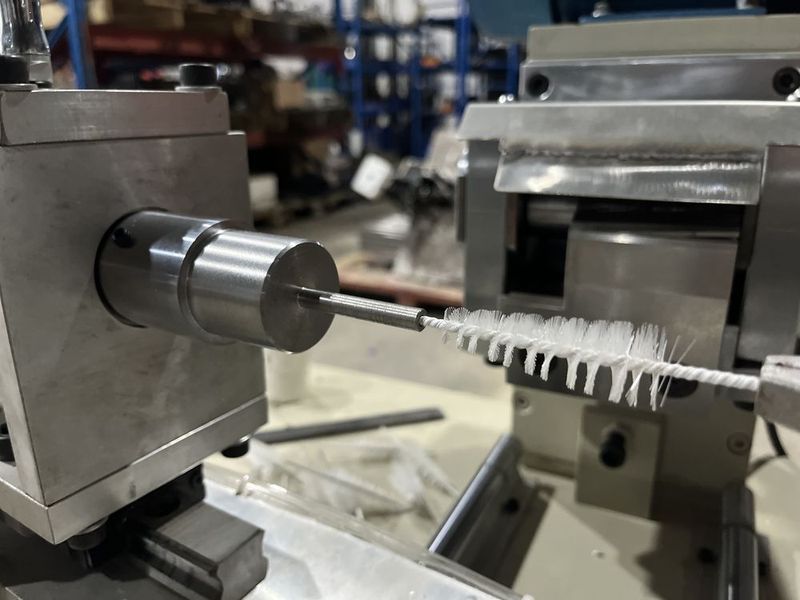Meixin Comb Brush Machinery
A leader in this industry ,specializing in brush making machine line for more than 14 years
1) Introduction:
The medical field required highest levels of accuracy and hygiene, especially in surgical and dental applications. Medical brushes are essential for preserving cleanliness, avoiding infections, and guaranteeing that medical treatments are carried out successfully. Specialized machinery called brush producing machines is used to create these necessary tools. This article explores the workings of brush producing machines, emphasizing their use in the manufacturing of dental and surgical brushes, their technological underpinnings, and their effects on healthcare.

2) Importance of Brushes in medical field:
Medical cleaning brushes are made to clean and sterilise environments by eliminating germs, dirt, and debris from medical equipment and surfaces. The cost of medical cleaning brushes is reasonable. Hospitals may increase the longevity of their medical instruments and equipment by employing medical cleaning brushes.
Medical brushes are indispensable in various applications:
i) Surgical Sanitization: Surgical tool cleaning is done with brushes to make sure the instruments are clean and ready for usage or sterilizing.
ii) Dental Hygiene: Brushes are necessary in dental offices for maintaining oral hygiene, cleaning teeth, and administering medicine.
iii) Microbiological Purposes: In laboratories, brushes are used to clean and handle sensitive specimens without contaminating them.
iv) Endoscope Cleaning: The cleaning of endoscopes, which are essential in minimally invasive operations, calls for specialized brushes.
3) Applications in Surgical Brush Production:
Strict requirements must be met by surgical brushes in order to guarantee patient safety and the smooth operation. Machines that make brushes are essential to this process:
i) Instrument Cleaning Brushes: When it comes to cleaning surgical equipment of both organic and inorganic dirt, these brushes need to be strong and efficient. In order to provide the best cleaning results, brush manufacturing machines make sure that the bristles are evenly dispersed and firmly bonded.
ii) Endoscope Cleaning Brushes: Specialized brushes that can maneuver through the complex channels of endoscopes are needed. The bristles on these brushes have to be tough and flexible enough to clean completely without causing harm, which means that the machines making them have to make sure of this.
4) Applications in Dental Brush Production:
Dental brushes must be precise and delicately effective, especially those used for orthodontic and prophylactic purposes:
i) Prophylaxis Brushes: During dental operations, these brushes are used to clean and polish teeth. Brush manufacturing machinery make sure that the bristles are strong enough to remove stains and plaque without causing damage to enamel.
ii) Orthodontic Brushes: These brushes are made to clean around braces and other orthodontic items; nevertheless, in order to properly clean regions that are difficult to reach, the bristle arrangement must be precise.
5) Impact on Healthcare
The advancements in brush making machines have had a significant impact on healthcare:
· Enhanced Hygiene: Premium brushes guarantee that dental and medical equipment is completely cleaned, lowering the possibility of infection.
· Improved Patient Outcomes: Better instruments enable medical staff to carry out treatments more skillfully, improving patient results.
· Cost Savings: As a result of more affordable brushes due to efficient production methods, healthcare practitioners may offer them to patients at a lesser cost.
· Innovation in Care: The capacity to manufacture customized brushes promotes innovation in dentistry and medicine by opening the door to novel methods and therapies.
6) Technological Advancements in Medical Brush Production:
The necessity for improved quality, efficiency, and hygiene has led to considerable technical breakthroughs in the manufacture of medical brushes.
Here are some notable innovations:
· Sterilization Technology: The efficacy and efficiency of sterilizing medical brushes have increased because to advancements in sterilization technology. Modern sterilizing machines employ techniques like plasma sterilization, which is quicker and more efficient than conventional techniques. These devices guarantee that brushes are safe to use in medicine and are sterile.
· Robotics Advancement: Medical brush manufacturing has changed as a result of automation. High accuracy and consistency are achieved in processes like bristle bundling, trimming, and assembly via robotic arms and sophisticated technologies. These technologies decrease the possibility of human mistake, speed up manufacturing, and eliminate the need for physical labor.
· Computer Numerical Control (CNC): Precision control over the tufting, trimming, and flagging operations is made possible by CNC technology, guaranteeing great quality and consistency.
Conclusion:
In order to produce medical brushes that satisfy the exacting requirements needed for surgical and dental applications, brush producing machines are essential. These devices create brushes using automation, cutting-edge materials, and precise engineering that promote patient outcomes, increase cleanliness, and advance dentistry and medical treatment. The importance of brush manufacturing equipment in healthcare is projected to increase as technology develops, leading to further advancements in the caliber and availability of medical brushes.
High standards of hygienic practices, accuracy, and consistency are necessary in the creation of medical brushes for use in surgery and dentistry. Modern brush manufacturing equipment is essential to meeting these requirements. Machines guarantee the creation of high-quality materials through processes including material selection, preparation, bristle setting, and sterilizing.
Copyright © 2025 Meixin Comb Brush Machinery Co., Ltd. | All Rights Reserved 粤I CP备18042005号-4